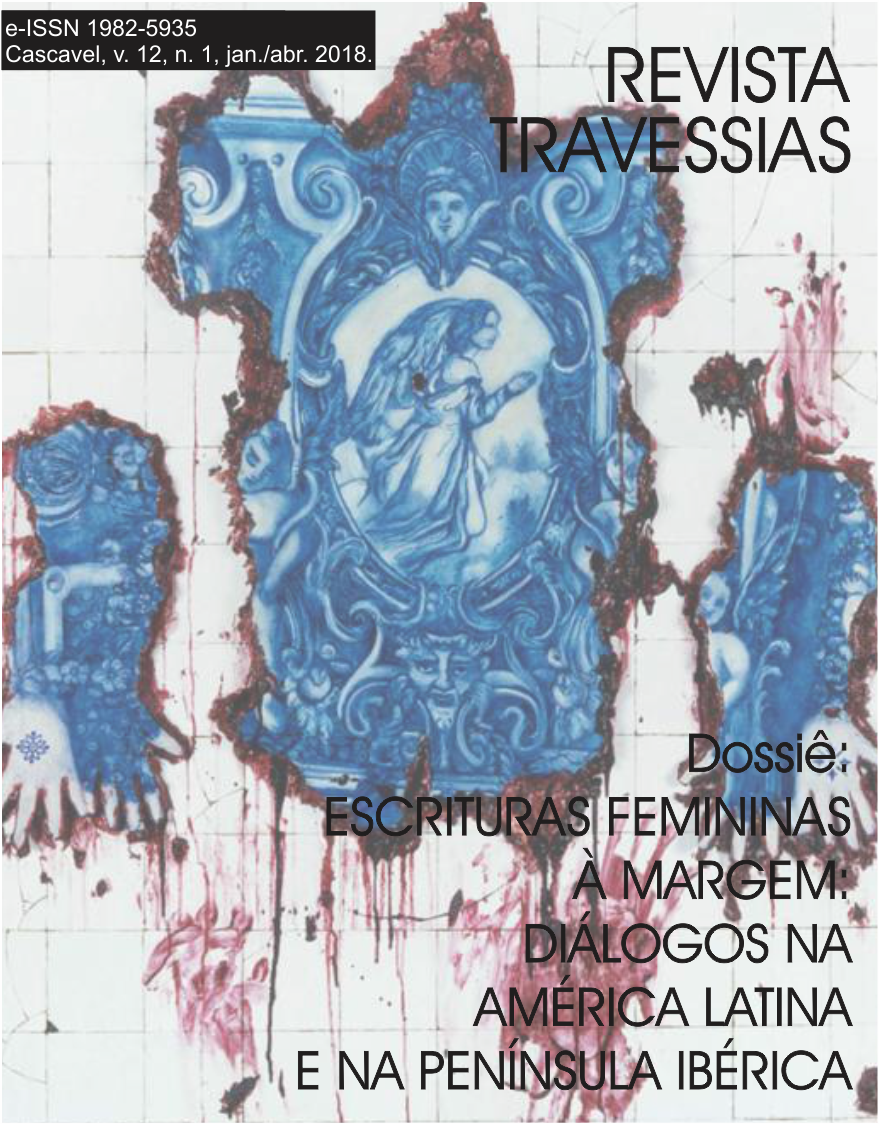Biting to live and writing to remember: Beatriz Leal’s Mulheres que mordem and the remembering of a time that cannot be forgotten in Latin America
Keywords:
Latin America dictatorships, feminine perspective, Mulheres que mordem, Beatriz Leal.Abstract
My goal in this work is to analyze how both female characters and their relations to Latin American civil-military dictatorships are built in the book Mulheres que mordem (Women who bite), by Brazilian author Beatriz Leal. This novel, which was published in 2015 and was nominated for the 58th Jabuti Awards, is focused on the Argentinian dictatorship and sets different points of view about this period and its consequences. From the female characters’ perspectives, one can trace a historical path for movements such as the Plaza de Mayo Mothers and Grandmothers, in order to reflect on the links between literature and memory, specially collective memory, and the processes of writing on the past, however recent and visceral. In order to do it, I use Beatriz Sarlo, Maurice Halbwachs and Paul Ricoeur to deal with the subject of memory. My intention is also to discuss the implications of fictional writing as a tool for symbolic production and remembering (as well as updating) the historical facts mentioned.
Downloads
References
DALCASTAGNÈ, Regina. Literatura brasileira contemporânea: um território contestado. Rio de Janeiro/Vinhedo: Editora da UERJ/Horizonte, 2012.
FOLHA DE SÃO PAULO. 40 anos do golpe militar na Argentina. Data 24/03/2016. Disponível em: <http://temas.folha.uol.com.br/40-anos-do-golpe-militar-na-argentina/>. Acesso em 02 de abril de 2018.
HALBWACHS, Maurice. A memória coletiva. Tradução de Laurent Léon Schaffter. São Paulo: Edições Vértice, 1990.
LEAL, Beatriz. Mulheres que mordem. Rio de Janeiro: Motor: Ímã editorial, 2015.
MENDES, Ricardo Antonio Souza. Ditaduras civil-militares no Cone Sul e a Doutrina de Segurança Nacional – algumas considerações sobre a Historiografia. Revista Tempo e Argumento. Florianópolis, SC, v. 5, n.10, jul./dez. 2013. p. 06 - 38.
Acesso em 02 de abril de 2018.
NEVES, Ozias Paese; LIEBEL, Vinícius. Os Regimes Militares no Brasil e na América do Sul - Historiografia e Perspectivas. Revista Eletrônica da ANPHLAC, nº. 18, p. 56-86, jan./jul. 2015. Disponível em: <http://revista.anphlac.org.br/>. Acesso em 02 de abril de 2018.
NOVARO, Marcos; PALERMO, Vicente. A ditadura militar Argentina 1976 -1983: do golpe de estado à restauração democrática. Tradução de Alexandra de Mello e Silva. São Paulo: Edusp, 2007.
PIZARRO, Ana et al. La literatura latinoamericana como proceso. Buenos Aires: Centro editor de América Latina, 1985.
RICOEUR, Paul. A Memória, a história, o esquecimento. Tradução de Alain François, Campinas: Unicamp, 2007.
RICOEUR, Paul. “Memory, history, oblivion”: Memória, história, esquecimento. Conferência. Data 8 de março de 2003. Budapeste, Hungria. Disponível em:< http://www.uc.pt/fluc/uidief/textos_ricoeur/memoria_historia> Acesso em 02 de abril de 2018.
ROJAS, Gonzalo Adrián. A ditadura militar na Argentina (1976-1983): retomando algumas hipóteses frente aos relatos oficiais. Revista Lutas Sociais, São Paulo, SP, vol.18 n.32, p.163-176, jan./jun. 2014. Disponível em: Acesso em 02 de abril de 2018.
SARLO, Beatriz. Tempo passado: cultura da memória e guinada subjetiva. Tradução de Rosa Freire d’Aguiar. São Paulo: Companhia das Letras; Belo Horizonte: UFMG, 2007.
VASCONCELOS, Lucío Flávio. Ditadura militar e reformismo no PERU (1968-1975). Saeculum - REVISTA DE HISTÓRIA [32]; João Pessoa, jan./jun. 2015. Disponível em: < http://www.periodicos.ufpb.br/index.php/srh/article/view/27094/14445> Acesso em 02 de abril de 2018.
VERBITSKY, Horacio. Memoria, verdad y justicia: el modelo argentino. In.: DO VALLE, Maria Ribeiro et al. 1964-2014: Golpe Militar, História, Memória e Direitos Humanos. São Paulo: Cultura Acadêmica, 2014.
Downloads
Published
How to Cite
Issue
Section
License
Creative Copyright Notice
Policy for Free Access Journals
Authors who publish in this journal agree to the following terms:
1. Authors keep the copyright and grant the journal the right of first publication, with the work simultaneously licensed under the Creative Commons Attribution License, which allows sharing the trial with acknowledgment of authorship and initial publication in this journal.
2. Authors are authorized to take additional contracts separately, for non-exclusive distribution of the work version, published in this journal (eg publish in institutional repository or as a book chapter), with acknowledgment of authorship and initial publication in this journal.
3. Authors are allowed and encouraged to publish and distribute their work online (eg in institutional repositories or on their personal page) at any point before or during the editorial process, as this can generate productive changes, as well as increase both impact and citation of the published trial (See The Effect of Free Access).
Creative Commons License
This work is licensed under a Creative Commons Attribution–NonCommercial-shareaswell 4.0 International License, which allows you to share, copy, distribute, display, reproduce, completely or part of the work, since there is no commercial purpose, and authors and source are cited.



